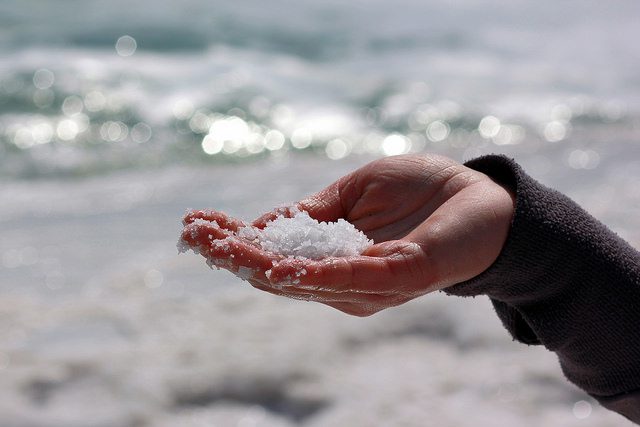
“Blessed are those who are persecuted for righteousness’ sake, for theirs is the kingdom of heaven” (Matthew 5:10; ESV).
I admire my friend Abir greatly. She is one of the strongest Christians I know, and is a person full of wisdom and discernment. But such strength and wisdom come with a price tag of suffering. Abir is an American citizen, who is of Palestinian descent. Her father is a Muslim, who struggled when she became a Christian given its associations in his mind with Western political powers that he believes often disregard and dehumanize Arabs and Muslims. Abir’s Evangelical American Christian brothers and sisters struggle with making space in their hearts for Palestinians, including Christians, not unlike Israel’s security guards when she passes through checkpoints back in Palestine. Where does she turn? To Jesus. Not to the ‘Jesus’ associated with a Christian Zionism in the States that discounts Palestinian concerns on the West Bank and Gaza Strip, but to Jesus, the Palestinian Jew from Nazareth, her fellow Semite. After all, Palestinian Christians trace their history back to the founding of the church in Palestine.
Like David in Uganda (refer here to a previous post), Abir is a person of peace and a peacemaker (Matthew 5:9). She longs for a just and equitable peace for Israel and the Palestinians. She also longs for American Christians to make peace with our faith and return to the Jesus of the New Testament. All too often, we are committed to preserving religious liberties here in the States. Now, religious liberty’s not a bad thing. One could even say it’s a very good thing unless it stands in the way of being slaves to Jesus and his righteous kingdom. All too often, we want to avoid persecution and will do nearly anything to preserve our liberties, failing to account for how Jesus said we are to be the salt of the earth—a preserving influence that is willing to suffer for the sake of making equitable peace in our society and the world. As noted in the biblical reflection on this passage, our saltiness as Jesus’ disciples is lost when we seek to avoid suffering and religious persecution and so won’t make peace (Connect Matthew 5:9 and 10 with Matthew 5:11-13). To repeat a point in that biblical reflection, Old Testament sacrifices were salted. Salt loses its import biblically when we don’t bear witness to Jesus as living sacrifices who endure suffering and persecution for his righteous name’s sake (Matthew 5:10-13; see also Leviticus 2:13; Ezekiel 43:24; Ezra 6:9).
We Christians need to account for our ancient faith rather than seek to avoid persecution and tribulation, which includes longing and praying for Jesus to take us out of this world. Contrary to what many Christians think, it is my firm conviction that Jesus never promises to take us out of tribulation, but to keep and preserve us in the midst of it (John 17:15; Revelation 3:10). Just as the kingdom is present and future, so our hope is not a hope jettisoned to some remote heavenly state, but one in which Jesus’ future kingdom breaks into our present suffering condition. As Matthew 5:10 reminds us, we are blessed for being persecuted by identifying with the Palestinian Jewish Jesus of the Bible. The kingdom of heaven belongs to us now!
Some American Christians might think they’re being persecuted for their faith when they get pushback for making disparaging remarks about Muslims or Arabs. In contrast, Abir has received pushback for trying to reconcile her Christian and Palestinian identity. She is viewed with suspicion for cherishing Arab Muslims as fellow humans, too. Moreover, Abir agonizes how American Evangelicals easily place national allegiance and security concerns over security and solidarity in Jesus as the church globally. Their faulty priorities lead them to treat their brothers and sisters in Jesus in Arab lands as expendable for America’s war on terror. But will this war as it is waged now only increase the threat of terror as it increases divisions between the Arab world and the West? How will we bridge the gap, as the Palestinian and Arab Christians who have often served as our only links and as agents of shalom in the region, experience increased risk of death and forced exile because of retaliation at the feet of Christian American missteps?
No doubt, Abir has shed some salty tears, but no matter how hard it is, the struggle’s worth it. She realizes that her suffering for the faith is not ultimately salt in her wounds. Her sufferings in Jesus here and abroad is bound up with being salt of the earth. Better salty tears than salt without sacrifice. The former is priceless. The latter has no value: “You are the salt of the earth, but if salt has lost its taste, how shall its saltiness be restored? It is no longer good for anything except to be thrown out and trampled under people’s feet” (Matthew 5:13; ESV).
Abir stands in a long line of Jesus’ disciples going back to first century Palestine, and to the prophets of old who came before them. These people of faith chose allegiance to Jesus over all other associations: “Blessed are you when others revile you and persecute you and utter all kinds of evil against you falsely on my account. Rejoice and be glad, for your reward is great in heaven, for so they persecuted the prophets who were before you” (Mathew 5:11-12; ESV).
A prophetic, reconciling life has value now and in the future, unlike a pathetic life that seeks after material reward. Such materialistic aims include numerical church growth resulting from catering to people’s consumerist and nationalistic preferences here and abroad. The kingdom of mammon has already come, but unlike Jesus’ kingdom, it won’t last forever.
Readers are also encouraged to read the biblical meditation titled “‘Blessed are those who are persecuted for righteousness’ sake,’ not tax evasion.”












